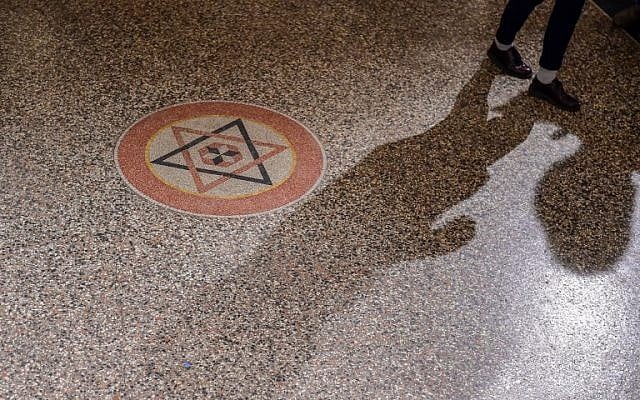



BERLIN — A man suspected of gathering information on Jewish locations and individuals in Berlin for Iranian intelligence with a possible view to carrying out attacks has been arrested in Denmark, German prosecutors said Tuesday.
The Danish national, identified only as Ali S. in line with German privacy rules, was arrested on Thursday in the Danish city of Aarhus, federal prosecutors said in a statement.
The man was tasked by an Iranian intelligence service early this year with gathering information on “Jewish localities and specific Jewish individuals” in Berlin, prosecutors said. They didn’t elaborate.
He spied on three properties in June, “presumably in preparation for further intelligence activities in Germany, possibly including terrorist attacks on Jewish targets,” prosecutors said.
The suspect is accused of working for an intelligence service of a foreign power. The information leading to his arrest came from Germany’s domestic intelligence service, prosecutors said.
The suspect will be brought before a judge in Germany to determine whether he is to be kept in custody pending formal charges after extradition from Denmark. It was not immediately clear when that would happen.
Germany is a staunch ally of Israel and has a long history of tense relations with Tehran, though it has been one of the three leading European powers trying to engage Iran in diplomacy over its nuclear program.
In October, Germany ordered the closure of all three Iranian consulates in the country in response to the Iranian judiciary’s announcement of the execution of Iranian-German prisoner Jamshid Sharmahd, who lived in the United States and was kidnapped in Dubai in 2020 by Iranian security forces. That left the Islamic Republic with only its embassy in Berlin.
Iran has a long track record of sowing violence against Jewish and Israeli targets abroad, including over the last two years, as its proxies in the Middle East have battled Israel on the ground.
Among the many examples, Swedish teens who tried to attack the Israeli embassy in Stockholm last year were acting on Iranian instructions, according to Swedish police, and authorities cited Iranian links in a shooting at a German synagogue and planned attacks at Jewish sites in Cyprus in recent years.
In one of the most searing examples, Iranian proxy group Hezbollah bombed the Israeli embassy in Buenos Aires in 1992, killing 29 people, after Israel assassinated its secretary-general.
Two years later, 84 people died when the AMIA Jewish community center in Buenos Aires was bombed, in an attack also attributed to Hezbollah with Iran’s backing. (Argentina’s current president, Javier Milei, has pushed to hold Iran responsible and visited Israel recently after receiving an award in part for those efforts.)
Iran was seen as having stepped up its targeting of Israeli sites abroad after the 2020 assassination of Mohsen Fakhrizadeh, the nuclear scientist Western intelligence agencies believed to be behind Iran’s nuclear weapons program, in an operation widely attributed to Israel.
In 2023, the Jewish Chronicle of London reported that a source had conveyed that Iranian officials had begun “mapping” Jewish targets abroad to prepare for potential attacks. (The report came from a Jewish woman who claimed to have infiltrated the Iranian regime and has not been matched by other publications.)
Iranian intelligence also has a history of working to engage Israelis in espionage on its behalf inside Israel, with recent months seeing a rise in suspects arrested and charged.
On Monday, the Israel Police and the Shin Bet security agency said they had arrested three Israeli citizens in two separate cases on suspicion that they carried out tasks for Iranian agents.
Concerns of possible revenge attacks from Iran spiked last month when Israel launched strikes on Iran’s nuclear and ballistic missile infrastructure, saying it was targeting an immediate and existential threat to the Jewish State.
As the attack on Iran began, Jewish security groups around the world immediately reiterated calls for vigilance, while emphasizing that they did not have information about specific threats. And Jewish sites around, including schools and synagogues, once again adjusted their security plans to reflect the heightened risk, even as uncertainty prevailed over Iran’s remaining capacity to guide attacks abroad.
Iran responded to the Israeli offensive with missile and drone attacks on Israel. After 12 days of fighting, the US brokered a ceasefire after itself bombing key Iranian nuclear sites.


